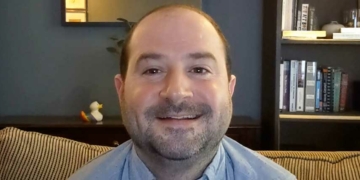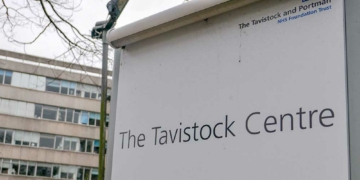The attempt to raise public awareness of the societal harm being caused by the gender lobby group Stonewall to women, gay people, and children, resembles the attempt to prise off the anchored lid from a very old paint tin. Hopeful efforts are made to insert various sturdy, flat objects at different points around the emulsion-encrusted lip of a defiantly unbudgeable cover, in the hope of finally levering it up into a joyous release.
This week, one of those lids finally came flying off, with the publication of a ten-part series of the BBC Ulster Nolan Investigates podcast that explores Stonewall’s influence on public bodies across the UK, including on governments, Ofcom, and on the BBC itself. That the BBC permitted two of its presenters to investigate its own relationship with Stonewall feels like an important milestone, and two intrepid investigative journalists, Stephen Nolan and David Thompson, focused on the involvement of high-profile public organisations with Stonewall’s highly controversial Diversity Champions and Workplace Equality Index Schemes. Other episodes turned attention to such themes as self-ID and gender identity, being “non-binary” in the UK, the Tavistock Clinic, and the legal advice given by Stonewall to public bodies.
Various parties were invited to participate in the programme, and where invitations to participate were declined, the presenters followed up with a list of questions instead. When the questions remained unanswered, Freedom of Information Act requests were used in an attempt (with limited success) to fill in the gaps. No stone was left unturned, no territory deemed out of bounds, and the presenters, as well as being thoroughly informed on gender ideology issues, were adept at rapidly identifying and exploring the salient points.
Stonewall, as is its wont, declined the invitation to take part in the series and even failed to answer many questions put to them by the investigators in response to being told that no one from Stonewall was available to speak. If Stonewall were confident of the ideology they are promoting, and confident about being able to defend how embedded they are in public bodies, one might have expected them to jump at this opportunity to present their case and set the record straight on a BBC programme. Stonewall’s well-established habit, however, is simply to hide themselves away from difficult questions and the light of enquiry: a diabolus absconditus that shape-shifts in the darkness. For a body that receives so much public money, its reluctance to offer proper public visibility and accountability is particularly unimpressive.
The Nolan Investigates programme on Stonewall is a paint-lid moment for the very reason that so many activists in the gender-critical community have been trying to persuade the BBC to exercise the objectivity and fairness demanded of it by its own Charter: in this case, in relation to the fair portrayal of, and engagement with, the opposition to Stonewall’s extreme gender ideology and to a proper examination of the BBC’s own relationship with that body.
If Stonewall were confident of the ideology they are promoting, and confident about being able to defend how embedded they are in public bodies, one might have expected them to jump at this opportunity to present their case and set the record straight on a BBC programme.
However, where the BBC is concerned, there are clearly some more lids to prise open. It declined to send a representative for interview – despite this being one of the BBC’s own programmes – and it left many important questions unanswered. Like other organisations examined by the programme, the BBC declined to release important details sought under Freedom of Information requests on the basis that these details could “have a detrimental impact on the commercial revenue of Stonewall”.
I bet they could.
Wouldn’t it be interesting to see this information that is being withheld by its partner organisations specifically to protect Stonewall’s income stream?
There is no adequate substitute to listening to this wide-ranging, refreshingly honest, and absorbing podcast series, and it would be difficult to do justice to the whole series in one article. The focus here will therefore mainly be on how it deals with the BBC and with Ofcom.
Even though it allowed Nolan Investigates to publish a podcast series that included negative evaluation of the BBC’s relationship with Stonewall, the BBC clearly held tight control over the information it was willing to share with the presenters, and much material was withheld, with many questions left unanswered. There are clearly, therefore, more paint tin lids to be prised off, albeit that the removal of this first lid, following so much effort, is an auspicious start.
The programme did, however, unearth some interesting evidence while raising questions about the BBC’s Diversity and Inclusion Department and its relationship to Stonewall. This Department’s remit is supposed to be restricted to internal BBC staff issues. The podcast includes a reference to a senior member of the Department describing Stonewall as “the experts in workplace equality for LGBTQ+ people” in an item of internal correspondence when asked questions about the BBC’s Allies Scheme. The mistaken rush for organisations to regard and refer to Stonewall as “the experts” while excluding informed advice and expertise that could be offered by other organisations, was an important motif in the programme.
The BBC’s Diversity and Inclusion Department was also described as running an “allies training” course that had been set up with Stonewall’s support and that uncritically used Stonewall’s controversial language and resources, such as the so-called genderbread person, without presentation of alternative viewpoints. Many listeners will have been further dismayed to learn from the presenters that the Diversity and Inclusion Department had even been allowed to influence the content of the most recent BBC News Style Guide with respect to sexuality and gender issues: a document that standardises the house language used in BBC News. The most recent BBC News Style Guide regurgitates the Stonewall redefinition of homosexuals as “people […] who are attracted to people of their own gender“: a redefinition that effectively attempts to erase the very definition of homosexuality on which the identity, the history and the rights of lesbian and gay people are based. Such is the extent of institutional capture at our national broadcaster, that BBC News blithely signed off this document with its gender-based, anti-gay definition of homosexuality.
A former investigative journalist for the BBC, Sam Smith, also spoke on the programme, sharing her view that some BBC employees are fearful of expressing their real opinions about Stonewall because the cosy BBC-Stonewall relationship described had had a chilling effect on free speech, and she also opined that this relationship had even affected the BBC’s output as a broadcaster. How can one highly controversial lobby group have been granted a special privilege to exert such influence on what is supposed to be our impartial national broadcaster?
Like the BBC, Ofcom is yet another public body that is supposed to be impartial but that has allowed itself to be taken hostage by the country’s main gender lobby outfit. The UK’s communications regulator was exposed by the programme as enjoying a relationship with Stonewall that many listeners might reasonably perceive to be subservient: not at all the kind of relationship that most members of the public would expect between our communications regulator and an external lobby group that promotes highly contentious ideology.
One particularly shocking revelation from the limited Freedom of Information Act material obtained by the programme was that Ofcom had taken details of rulings it had made against broadcasters and incorporated them in its submissions to Stonewall in respect of its own Workplace Equality Index evaluations…
Ofcom had been a member of both the Diversity Champions Scheme and the Workplace Equality Index Scheme. Only the former requires a paid subscription, though Diversity Champion Scheme membership is something that an organisation’s goggle-eyed gender zealots would no doubt expect to improve its prospects of rising on the Workplace Equality Index, where lackey outfits that may have fallen to Stockholm syndrome compete with one another for the highest possible place in the top-100 listing. Whether coincidental or not, Ofcom withdrew from the Diversity Champions Scheme in August, not long after being approached by Nolan Investigates, declaring that they had done so after considering whether there was a conflict of interest, while at the same time incongruently asserting to the programme that there had been no conflict of interest in Ofcom’s relationship with Stonewall. Do Workplace Equality Index members get extra points for doublethink?
Ofcom was one of the several entities that declined the invitation to be interviewed on the programme, and they also failed to provide answers to a number of questions asked of them. One particularly shocking revelation from the limited Freedom of Information Act material obtained by the programme was that Ofcom had taken details of rulings it had made against broadcasters and incorporated them in its submissions to Stonewall in respect of its own Workplace Equality Index evaluations, as evidence of its proactive stance in promoting LGBTQ+ ideology, and presumably in an effort to curry favour with Stonewall.
A BBC News article written by one of the Nolan Investigates presenters, David Thompson, reveals that Stonewall had for three consecutive years requested evidence from Ofcom of their actions to “promote LGBT equality in the wider community“, in response to which Ofcom had presented the examples of these LGBTQ+ related rulings they had made following complaints about broadcasters, including local radio stations. Mr Thompson refers to a 2019 submission, where Ofcom had informed Stonewall that they had ruled on two instances where “transphobic comments made in programmes breached the code“. Mr Thompson revealed that Ofcom had refused to release Stonewall’s feedback on this submission.
This, of course, raises very serious questions about Ofcom’s regulatory independence and makes it vulnerable to the accusation that its impartiality – or, at the very least, the public perception of its impartiality – could be damaged by a serious apparent conflict of interest represented by its ambition to achieve promotion on Stonewall’s Workplace Equality Index. Ofcom findings against broadcasters that are concordant with Stonewall’s LGBTQ+ ideology could be construed as having been encouraged by Ofcom’s ambition to meet Stonewall’s lobbying demands and to advance Ofcom on the Workplace Equality Index. How unedifying to see our public regulator tugging at Daddy Stonewall’s sleeve to show him she has been a good girl and obediently devoured all her indigestible gender salad.
Although Ofcom has now left the Diversity Champions Scheme, the conflict-of-interest problem continues unabated, as Ofcom has still failed to leave the Workplace Equality Index Scheme. It is perfectly reasonable for the public to assume that Stonewall will continue to mark Ofcom’s homework, perhaps awarding gold stars for politically-correct rulings against thoughtcrime broadcasters identified as gender-offenders. The pernicious influence of Hide-Away Stonewall has clearly got out of control, and it has become a scourge on British society and a blight on those institutions that have locked themselves into its thrall. Stonewall’s shiftiness in keeping itself out of public scrutiny, and the detriment it causes with its fundamentalist agenda largely advanced outside the public gaze, lend to Stonewall the appearance of a sinister fifth column going all out to evade detection by the public of the harm it is causing and the institutions it is colonising.
Ofcom insists that it will continue to submit to the Workplace Equality Index Scheme, asserting that it “is an effective way for employers to measure their progress in LGBTQ+ inclusion in the workplace“, even though it is evident from their previous supplications that its submissions include rulings against broadcasters: something clearly far outside the scope of internal workplace inclusion policies.
The presenters did their level best to ensure a balanced programme, with Stonewall given a fair hearing: a task made all the more challenging when Stonewall stay hunkered-down in their basement, declining the opportunity to be interviewed on programmes, and failing to answer written questions. Their replies to the Nolan Investigates team instead consisted of robotic, inane and unconvincing short statements to be read out on the programme, written in well-rehearsed corporatespeak and devoid of any credible meaning. The hiding-basement clearly feels like their safe space when mature adults come looking for answers and explanations.
Given that Stonewall declined the opportunity to state their case and fight their corner, the presenters themselves sometimes played devil’s advocate and defended Stonewall against some criticisms by their guests. There were even times when a defensible criticism was thundered down with a choleric eruption that implied the speaker had committed overreach: outbursts that contained a hint of melodrama – a ventriloquist’s roar from the safe-space bunker, executed by presenters keen to be even-handed and to provide some kind of advocacy for absent guests undergoing a merciless reputational evisceration in ten acts.
The lid is off, and readers are strongly encouraged to listen to this very well-researched and well-presented series on how ideological basement-dwellers have colonised some of our most important institutions.
Such was the apparent eagerness of Nolan Investigates to highlight Stonewall’s positives amidst a blizzard of damning disclosures, that one presenter even took to expressing admiration at how very successful Stonewall had been in promoting its ideology and securing so much influence in so many public bodies, with exclamations such as, “What a powerful, clever organisation!”. At one stage, a guest was even successfully encouraged to join in with the power and cleverness compliments in this “wow, give them credit” mode. It was well-meant, and it felt as though the presenters were keen to say something positive about the deservedly beleaguered Stonewall in the service of impartiality, given the implication via their absence that they had nothing good to say for themselves. However, when people do bad things, and when so many people are still suffering from the bad things they do, praising the effectiveness of their modus operandi and the cleverness of those capable of effecting such self-serving and destructive behaviour, might have stretched the patience of some listeners a little.
The lid is off, and readers are strongly encouraged to listen to this very well-researched and well-presented series on how ideological basement-dwellers have colonised some of our most important institutions. It is a series in which Stonewall have once again become stonewallers par excellence, and where even Stonewall’s loyal friends who showed up to support them quickly became entangled in, and ensnared by, their own gobbledygook, gender-babble, and echo-chamber convolutions. Occasionally, I also discerned that irritating “upspeak” or “rising inflection” phenomenon that is popular among teenagers, and which, I am informed, has the technical name of the “high rising terminal”. When it appears too often in the diction of mature adults, it might be hard to resist the suspicion that a permanent attachment is in place to an immature and adolescent mode of thinking, speaking, and doing. A mode that represents a jejune understanding of the world; that can be childish, dogmatic and inflexible; that can be impervious to the harmful effects of a favoured ideology on other people; and that can be inclined to silencing dissent and demonising dissenters, and to perceiving all disagreement as a personal insult. A mode that, in my view, describes Stonewall’s ethos, and that of its acolytes, quite accurately.
A stubborn lid was successfully removed with the Nolan Investigates podcast. For so long, many people in the gender-critical community had been trying to make some progress with getting that resistant tin of BBC Whitewash to open. But there is more to the story than the public organisations concerned have allowed the public to know, and there are certainly many more stuck lids to lever off: at the BBC, at Ofcom, in local and national governments, and at all the public institutions that have ceded power to an extreme gender lobby outfit in a betrayal of their obligations to the public who fund them.
Dislodging those remaining lids might well involve a protracted process with multiple attempts, with varying methods, and with what may feel at the time like wasted energy. Yet every small intervention makes a tiny contribution to the process that may eventually lead to a very successful outcome. The 999th attempt may still fail, but each individual attempt may have brought some loosening, and the 1000th attempt may be triumphant. We must never give up, and the emergence of this excellent BBC podcast series demonstrates what can emerge in unexpected places when we resist, when we protest, and when we persist. Our voices are, at last, being heard.
Gary Powell is a gay man and has been active in gay politics since 1980. He is the Research Fellow for Sexual Orientation and Gender Identity at the Bow Group and the European Special Consultant to the Center for Bioethics and Culture.
























Comments
No comments yet, be the first to leave a comment.